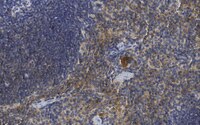MABF2070 Sigma-AldrichAnti-Protein-tyrosine phosphatase eta (CD148) Antibody, clone 8A-1
Anti-Protein-tyrosine phosphatase eta (CD148), clone 8A-1, Cat. No. MABF2070, is a Syrian hamster monoclonal antibody that detects Receptor-type tyrosine-protein phosphatase eta (CD148) and is tested for use in Flow Cytometry, Immunohistochemistry (Paraffin), and Western Blotting.
More>> Anti-Protein-tyrosine phosphatase eta (CD148), clone 8A-1, Cat. No. MABF2070, is a Syrian hamster monoclonal antibody that detects Receptor-type tyrosine-protein phosphatase eta (CD148) and is tested for use in Flow Cytometry, Immunohistochemistry (Paraffin), and Western Blotting. Less<<Recommended Products
Overview
| Replacement Information |
|---|
Key Specifications Table
| Species Reactivity | Key Applications | Host | Format | Antibody Type |
|---|---|---|---|---|
| M | FC, IH(P), WB | SHm | Purified | Monoclonal Antibody |
| References |
|---|
| Product Information | |
|---|---|
| Format | Purified |
| Presentation | Purified Syrian hamster monoclonal antibody IgG2-IgG3 in buffer containing 0.1 M Tris-Glycine (pH 7.4), 150 mM NaCl with 0.05% sodium azide. |
| Quality Level | MQ100 |
| Physicochemical Information |
|---|
| Dimensions |
|---|
| Materials Information |
|---|
| Toxicological Information |
|---|
| Safety Information according to GHS |
|---|
| Safety Information |
|---|
| Storage and Shipping Information | |
|---|---|
| Storage Conditions | Stable for 1 year at 2-8°C from date of receipt. |
| Packaging Information | |
|---|---|
| Material Size | 100 μg |
| Transport Information |
|---|
| Supplemental Information |
|---|
| Specifications |
|---|
| Global Trade Item Number | |
|---|---|
| Catalog Number | GTIN |
| MABF2070 | 04054839396625 |







